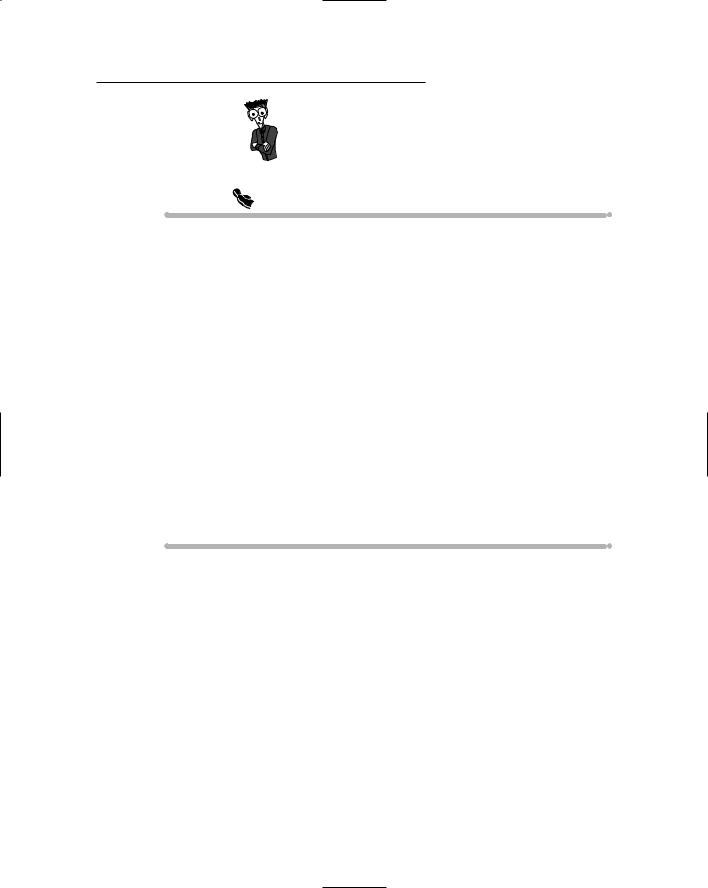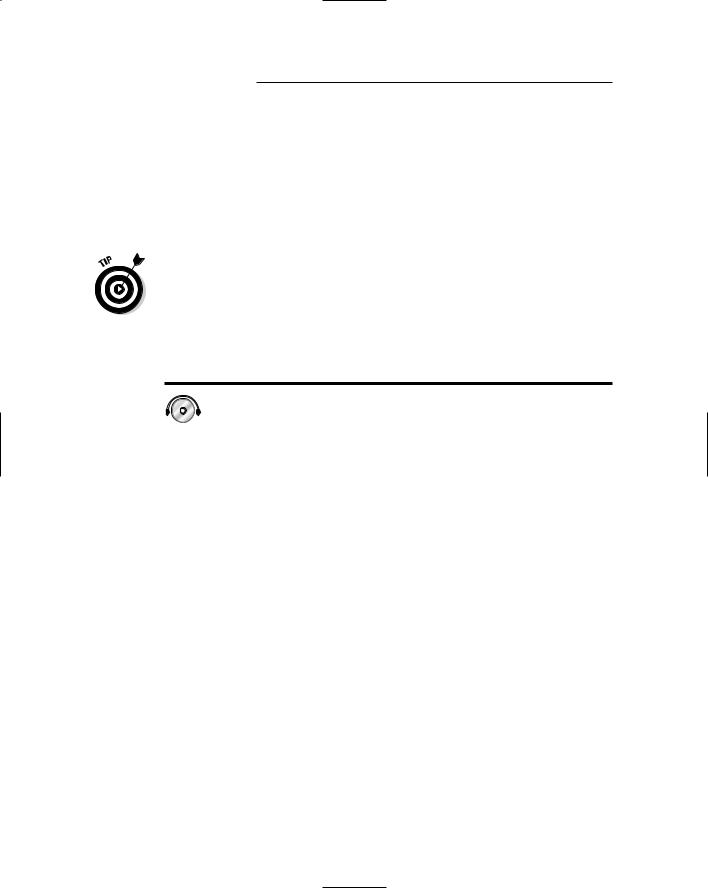
Arabic_for_Dummies
.pdf
236 Part III: Arabic on the Go
When you pay the faatuura, it’s a good idea to get a ‘iiSaala (eeh-sah-lah; receipt) in case you have a problem with the bill later on or can be reimbursed for your travel costs.
Talkin’ the Talk
Gabrielle is ready to check out of her room.
Gabrielle: mataa waqt al-khuruuj? mah-tah wah-ket al-koo-rooj?
When is the checkout time?
Clerk: waqt al-khuruuj ma’a as-saa’a al-waaHida.
wah-ket al-koo-rooj mah-ah ah-sah-ah al-wah-hee-dah.
Checkout time is at 1:00.
Gabrielle: Tayyib. maa hiya al-faatuura al-’aama?
tah-yeeb. mah hee-yah al-fah-too-rah al-ah-mah?
Okay. What’s the total bill?
Clerk: khamsa mi’at daraahim. kamsah mee-at dah-rah-heem.
Five hundred dirhams.
Gabrielle: ‘uriidu ‘iiSaala min faDlik. oo-ree-doo ee-sah-lah meen fad-leek.
I’d like a receipt please.
Clerk: Tab’an. shukran li ziyaaratuki wa ‘ilaa al-liqaa’! tah-bah-an. shook-ran lee zee-yah-rah-too-kee wah ee-lah al-lee-kah!
Of course. Thank you for your visit, and we look forward to seeing you soon!

Chapter 13: Staying at a Hotel 237
 Fun & Games
Fun & Games
Match the Arabic words and phrases with their English equivalents:
Arabic terms and phrases:
1.faatuura al-haatif
2.hal hunaaka khabaran lii?
3.maktab al-’istiqbaal
4.maraafiq
5.mataa waqt al-khuruuj?
English terms and phrases:
A.Are there any messages for me?
B.When is the checkout time?
C.Telephone bill
D.Reception desk
E.Amenities
The answers are in Appendix C.

238 Part III: Arabic on the Go

Chapter 14
Getting from Here to There: Transportation
In This Chapter
Taking to the skies
Catching taxis, buses, and trains
When it comes to getting around the block, the city, or the world, you have a lot of different modes of naql (nah-kel; transportation) to
choose from. And making the right choice for you is extremely important, particularly if you’re traveling in a foreign country. Modes of transportation differ from region to region and country to country, so it’s important you are aware of subtle differences between the transportation methods you’re used to and those you discover when you’re traveling abroad.
In this chapter, I tell you, in Arabic, not only how to use all major transportation methods but also how to navigate a Middle Eastern city using these modes of transport.
Traveling by Plane
One of the most common methods of naql is flying in a Taa’ira (tah-ee-rah; airplane). The Taa’ira is probably the best method of naql to help you get to a distant location in the least amount of time. Chances are if you’re in North America or Europe and want to go to the Middle East, you’ll take a Taa’ira.
Making reservations
The first step in air travel is making a Hajzu (haj-zoo; reservation) and buying a biTaaqat as-safar (bee-tah-kat ah-sah-far; plane ticket).You may purchase your biTaaqat as-safar the traditional way, by simply visiting your wakiil

240 Part III: Arabic on the Go
safariyaat (wah-keel sah-fah-ree-yat; travel agent). However, in this technological age, more and more people choose to bypass the wakiil safariyaat in favor of online travel agents. Even though you get more personalized service from a wakiil safariyaat, you can probably get better deals by ordering your plane tickets online. If you’re not sure where you want to go, the wakiil safariyaat may be able to suggest destinations to suit your specific traveling needs. But if you know exactly where you want to go, using an online travel agent is probably more appropriate.
One of the potential pitfalls of going through online travel agents — particularly if you use a specialized broker that focuses on specific global destinations, such as the Middle East — is making sure that the online site is reputable. In order to not get fooled, I recommend you use one of the more established online travel agents, such as Expedia.com or Travelocity.com.
Talkin’ the Talk
Sophia calls her travel agent, Ahmed, to make an airline reservation.
Sophia: ‘ahlan wa sahlan ‘aHmed. haadhihi sofia.
ahel-an wah sa-hel-an ah-med. hah-zee-hee so-fee-ah.
Hi Ahmed. This is Sophia.
Ahmed: ‘ahlan sofia. kayfa yumkin ‘an ‘usaa’iduki?
ahel-an so-fee-yah. kay-fah yoom-keen ann oo-sah- ee-doo-kee?
Hi Sophia. How may I help you?
Sophia: ‘uriidu ‘an ‘adhhab ‘ilaa ‘ad-daar ‘al-bayDaa’ ma’a
‘ummii li al-’uTla.
oo-ree-doo an az-hab ee-lah ah-dar al-bay-dah mahah oo-mee lee al-oot-lah.
I would like to go to Casablanca for the holidays with my mother.
Ahmed: raa’i’! haadhihi fikra mumtaaza. wa mataa turiidaani
‘an tadhabaani?
rah-eeh! hah-zee-hee feek-rah moom-tah-zah. wah mah-tah too-ree-dah-nee an taz-hah-bah-nee?
Excellent! That’s a great idea. And when would you like to go?

Chapter 14: Getting from Here to There: Transportation 241
Sophia: nuriidu ‘an nadhhab yawm as-sabt. noo-ree-doo an naz-hab yah-oum ah-sabt.
We would like to go on Saturday.
Ahmed: kwayyis. ma’a ‘ay saa’a? kuh-wah-yees. mah-ah ay sah-ah?
Okay. At what time would you like to leave?
Sophia: hal ‘indaka Tayaraan ma’a ‘as-saa’a al-khaamisa? hal een-dah-kah tay-yah-ran mah-ah ah-sah-ah al- kah-mee-sah?
Do you have any flights at 5:00?
Ahmed: na’am. nah-am.
Yes.
Sophia: Tayyib. sana’khudh biTaaqatayn min faDlik. tah-yeeb. sah-nah-kooz bee-tah-kah-tayn meen fad-leek.
Good. We’ll take two tickets please.
Ahmed: hal turiidaani maqaa’id ‘amaama ‘an-naafida ‘aw bayna al-maqaa’id?
hal too-ree-dah-nee mah-kah-eed ah-mah-mah ah- nah-fee-dah ah-ou bay-nah al-mah-kah-eed?
Would you like window or aisle seats?
Sophia: maqaa’id ‘amaama ‘an-naafida min faDlik. mah-kah-eed ah-mah-mah ah-nah-fee-dah meen fad-leek.
Window seats please.
Ahmed: ‘indii biTaaqatayn li maqaa’id ‘amaama ‘an-naafida li
Tayaarin li daar al-bayDaa’ yawm as-sabt ma’a ‘assaa’a al-khaamisa.
een-dee bee-tah-kah-tayn lee mah-kah-eed ah-mah- mah ah-nah-fee-dah lee tah-yah-reen lee dar al-bay- dah ya-oum ah-sah-bet ma-ah ah-sah-ah al-kah-mee-sah.
So I have two tickets for window seats for a flight to Casablanca on Saturday at 5:00.
Sophia: mumtaaz! moom-taz!
Excellent!

242 Part III: Arabic on the Go
Ahmed: riHla sa’eeda! reeh-lah sah-ee-dah!
Have a nice trip!
Sophia: shukran! shook-ran!
Thank you!
Words to Know
‘uTla |
oot-lah |
holiday/vacation |
biTaaqa |
bee-tah-kah |
ticket |
biTaaqatayn |
bee-tah-kah-tayn |
2 tickets |
biTaaqaat |
bee-tah-kaht |
tickets (3 or |
|
|
more) |
Tayaraan |
tah-yah-ran |
flight |
maq’ad |
mak-had |
seat |
maqaa’id |
mah-kah-eed |
seats (3 or more) |
bayna al-maqaa’id |
bay-nah al-mah- |
aisle seat(s) |
|
kah-eed |
|
maq’ad an- |
mak-had ah-nah- |
window seat |
naafida |
fee-dah |
|
riHla |
reeh-lah |
voyage |
safar |
sah-far |
trip |
musaafir |
moo-sah-feer |
traveler (M) |
mussafira |
moo-sah-fee-rah |
traveler (F) |
musaafiruun |
moo-sah-fee-ruun |
travelers (M) |
musaafiraat |
moo-sah-fee-rat |
travelers (F) |

Chapter 14: Getting from Here to There: Transportation 243
Getting some legwork out of the verb “to travel”
If there’s one verb you need to be familiar with relating to travel, it’s the verb saafara (sah-fah-rah), which conveniently means “to travel.” Even though saafara has four consonants instead of the usual three, it’s nevertheless considered to be a regular verb because the fourth consonant, the ‘alif, is actually a consonant that acts as a long vowel elongating the siin. (For more on regular verbs, flip to Chapter 2.) So saafara is conjugated in the maaDii (past) and the muDaari’ (present) the same way as most other regular verbs. Here is the verb saafara in the maaDii form:
Form |
Pronunciation |
Translation |
‘anaa saafartu |
ah-nah sah-far-too |
I traveled |
‘anta saafarta |
ahn-tah sah-far-tah |
You traveled (MS) |
‘anti saafartii |
ahn-tee sah-far-tee |
You traveled (FS) |
huwa saafara |
hoo-wah sah-fah-rah |
He traveled |
hiya saafarat |
hee-yah sah-fah-rat |
She traveled |
naHnu saafarnaa |
nah-noo sah-far-nah |
We traveled |
‘antum saafartum |
ahn-toom sah-far-toom |
You traveled (MP) |
‘antunna saafartunna |
ahn-too-nah sah-far- |
You traveled (FP) |
|
too-nah |
|
hum saafaruu |
hoom sah-fah-roo |
They traveled (MP) |
hunna saafarna |
hoo-nah sah-far-nah |
They traveled (FP) |
antumaa safartumaa |
ahn-too-mah sah-far- |
You traveled (dual/MP/FP) |
|
too-mah |
|
humaa saafaraa |
hoo-mah sah-fah-rah |
They traveled (dual/MP) |
humaa saafarataa |
hoo-mah sah-fah- |
They traveled (dual/FP) |
|
rah-tah |
|
Use the form yusaafiru to conjugate “traveling” in the muDaari’:
Form |
Pronunciation |
Translation |
‘anaa ‘usaafiru |
ah-nah oo-sah-fee-roo |
I am traveling |
‘anta tusaafiru |
ahn-tah too-sah-fee-roo |
You are traveling (MS) |
‘anti tusaafiriina |
ahn-tee too-sah-fee- |
You are traveling (FS) |
|
ree-nah |
|
huwa yusaafiru |
hoo-wah yoo-sah-fee-roo |
He is traveling |

244 Part III: Arabic on the Go
hiya tusaafiru |
hee-yah too-sah-fee-roo |
She is traveling |
naHnu nussafiru |
nah-noo noo-sah-fee-roo |
We are traveling |
‘antum tusaafiruuna |
ahn-toom too-sah-fee- |
You are traveling (MP) |
|
roo-nah |
|
‘antunna tusaafirna |
ahn-too-nah too-sah- |
You are traveling (FP) |
|
feer-nah |
|
hum yusaafiruuna |
hoom yoo-sah-fee-roo-nah |
They are traveling (MP) |
hunna yusaafirna |
hoo-nah yoo-sah-feer-nah |
They are traveling (FP) |
antumaa tusaafiraani |
ahn-too-mah too-sah-fee- |
You are traveling |
|
rah-nee |
(dual/MP/FP) |
humaa yusaafiraani |
hoo-mah yoo-sah-fee- |
They are traveling |
|
rah-nee |
(dual/MP) |
humaa tusaafiraani |
hoo-mah too-sah-fee- |
They are traveling |
|
rah-nee |
(dual/FP) |
Registering at the airport
With a biTaaqat as-safar, you’re ready to head off to the maTaar (mah-tar; airport) and board the Taa’ira. But before you actually get on the Taa’ira, you need to take care of a few logistical things. First, you must present your jawaaz as-safar (jah-waz ah-sah-far; passport) and your biTaaqat as-safar at the airport tasjiil (tass-jeel; registration) desk, which is located in the maHaTTat alkhuTuut al-jawwiya (mah-hah-tah al-koo-toot al-jah-wee-yah; airport terminal). Second, you must also answer some ‘as’ila (ass-ee-lah; questions) about your safar and your ‘amti’a (am-tee-ah; luggage).
Talkin’ the Talk
At the airport, Zayneb is registering her luggage.
Attendant: kam min ‘amti’a ‘induki?
kam meen am-tee-ah een-doo-kee?
How many pieces of luggage do you have?
Zayneb: ‘indii thalaathat ‘amti’a: shanTatayn wa miHfaDHa waaHida.
een-dee tha-lah-that am-tee-ah: shan-tah-tayn wah meeh-fah-dah wah-hee-dah.
I have three pieces of luggage: two suitcases and a briefcase.

Chapter 14: Getting from Here to There: Transportation 245
Attendant: kam min ‘amti’a satusajjiliina?
kam meen am-tee-ah sah-too-sah-jee-lee-nah?
How many pieces of luggage are you going to register?
Zayneb: sa’usajjilu ash-shanTatayn wa sa’aakhudu almiHfaDHa ma’ii fii ‘aT-Taa’ira. sah-oo-sah-jee-loo ah-shan-tah-tayn wah sah-ah-
khoo-zoo al-meeh-fah-dah mah-ee fee ah-tah-ee-rah.
I’m going to register the two suitcases, and I will take the briefcase with me on the plane.
Attendant: kwayyis. hal naDHamti al-’amti’a binafsuki? keh-wah-yees. hal nah-zam-tee al-am-tee-ah bee-naf- soo-kee?
Okay. Did you pack your bags by yourself?
Zayneb: |
na’am. |
|
nah-am. |
|
Yes. |
Attendant: |
lam yunaDHDHim shakhsun ‘aakhar al-’amti’a? |
|
lam yoo-nah-zim shak-soon ah-kar al-am-tee-ah? |
|
No one else packed the bags? |
Zayneb: |
laa’. ‘anaa binafsii. |
|
lah. ah-nah bee-naf-see. |
|
No. By myself. |
Attendant: |
hal kul shay’ fii al-’amti’a milkuki? |
|
hal kool shay fee al-am-tee-ah meel-koo-kee? |
|
Is everything in the bags yours? |
Zayneb: |
na’am. |
|
nah-am. |
|
Yes. |
Attendant: |
hal kaanat al-’amti’a ma’akii fii kul al-waqt? |
|
hal kah-nat al-am-tee-ah mah-ah-kee fee kool al- |
|
wah-ket? |
|
Have you had the bags in your possession at all times? |
Zayneb: |
na’am. |
|
nah-am. |
|
Yes. |
Attendant: |
shukran. Tayaraan sa’iid. |
|
shook-ran. tah-yah-ran sah-eed. |
|
Thank you. Have a nice flight. |
